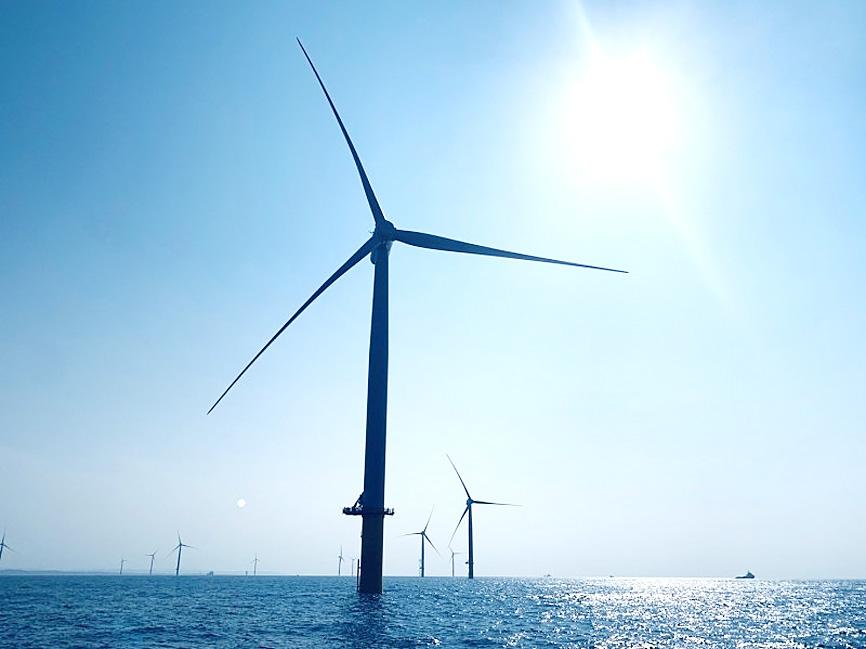The nation would be 40 percent behind schedule this year for its offshore wind farm targets, the Bureau of Energy said yesterday, citing delays related to the COVID-19 outbreak.
However, it said its goal to have “5 gigawatts [GW] in the water by 2025” remains unchanged.
“According to our contracts, a minimum of 933 megawatts [MW] was supposed to join the grid this year, but with the disruption caused by the COVID-19 outbreak, we are expecting only 557 megawatts,” the bureau said.

Photo: Lin Jing-hua, Taipei Times
The government’s ambitious plans for offshore wind farms originally called for as much as 2.6GW of power from wind turbine generators to join the grid by the end of this year, but there have been numerous delays, including the 376MW Formosa 2 project off Miaoli County implementing two six-month delays and the 350MW Liwei project near Taoyuan being canceled due to concerns over aviation safety.
The COVID-19 outbreak in May came in the middle of the prime construction season, causing major disruption for vessels working on projects after the Central Epidemic Command Center barred foreigners without Alien Resident Certificates from entering the nation.
While fresh crews were allowed to enter under a “special project permission,” Energy Technology Division Director Chen Chung-hsien (陳崇憲) said that receiving permission had been “onerous.”
Companies say that the inability to rotate crews has not just caused project delays, but also mental health issues for workers.
“The timing is very unfortunate,” said Raoul Kubitschek, a renewable energy expert at the Taiwan branch of consultancy NIRAS Gruppen A/S. “We have until October before the monsoon makes it impossible to work at sea for the rest of the year.”
Work would then restart in March next year and Kubitschek said that the knock-on effects might make it difficult to catch up.
“There will be bottlenecks, such as availability of harbor space, that will make it difficult to catch up on the lost time,” he said.

The CIA has a message for Chinese government officials worried about their place in Chinese President Xi Jinping’s (習近平) government: Come work with us. The agency released two Mandarin-language videos on social media on Thursday inviting disgruntled officials to contact the CIA. The recruitment videos posted on YouTube and X racked up more than 5 million views combined in their first day. The outreach comes as CIA Director John Ratcliffe has vowed to boost the agency’s use of intelligence from human sources and its focus on China, which has recently targeted US officials with its own espionage operations. The videos are “aimed at

STEADFAST FRIEND: The bills encourage increased Taiwan-US engagement and address China’s distortion of UN Resolution 2758 to isolate Taiwan internationally The Presidential Office yesterday thanked the US House of Representatives for unanimously passing two Taiwan-related bills highlighting its solid support for Taiwan’s democracy and global participation, and for deepening bilateral relations. One of the bills, the Taiwan Assurance Implementation Act, requires the US Department of State to periodically review its guidelines for engagement with Taiwan, and report to the US Congress on the guidelines and plans to lift self-imposed limitations on US-Taiwan engagement. The other bill is the Taiwan International Solidarity Act, which clarifies that UN Resolution 2758 does not address the issue of the representation of Taiwan or its people in

US Indo-Pacific Commander Admiral Samuel Paparo on Friday expressed concern over the rate at which China is diversifying its military exercises, the Financial Times (FT) reported on Saturday. “The rates of change on the depth and breadth of their exercises is the one non-linear effect that I’ve seen in the last year that wakes me up at night or keeps me up at night,” Paparo was quoted by FT as saying while attending the annual Sedona Forum at the McCain Institute in Arizona. Paparo also expressed concern over the speed with which China was expanding its military. While the US

SHIFT: Taiwan’s better-than-expected first-quarter GDP and signs of weakness in the US have driven global capital back to emerging markets, the central bank head said The central bank yesterday blamed market speculation for the steep rise in the local currency, and urged exporters and financial institutions to stay calm and stop panic sell-offs to avoid hurting their own profitability. The nation’s top monetary policymaker said that it would step in, if necessary, to maintain order and stability in the foreign exchange market. The remarks came as the NT dollar yesterday closed up NT$0.919 to NT$30.145 against the US dollar in Taipei trading, after rising as high as NT$29.59 in intraday trading. The local currency has surged 5.85 percent against the greenback over the past two sessions, central